| Srl | Item |
| 1 |
ID:
103861
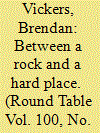

|
|
|
|
|
| Publication |
2011.
|
| Summary/Abstract |
This article explores the role and effectiveness of small state trade diplomacy in the negotiations to conclude Economic Partnership Agreements (EPAs) between the European Union (EU) and the African, Caribbean and Pacific (ACP) group of countries, focusing specifically on the Southern African Development Community (SADC). Given the vast power asymmetries between the EU and the ACP, small states have had limited bargaining power to shape the process and the outcome of the negotiations. Unlike most other ACP EPA negotiations, the SADC small states were also caught between a rock (EU) and a hard place (South Africa), with both parties competing to promote their visions for regional integration. In the end, the EPA process split SADC into four sets of separate trade regimes with the EU, undermining the established regional integration project. The article explains this divisive outcome of the SADC EPA process by analysing the negotiation behaviour of the main parties, specifically the 'weaker' players. The article concludes with key lessons for small states' future trade negotiations.
|
|
|
|
|
|
|
|
|
|
|
|
|
|
|
|
| 2 |
ID:
103862
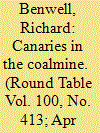

|
|
|
|
|
| Publication |
2011.
|
| Summary/Abstract |
Climate change presents a useful case in the study of small states because their interests can be differentiated from larger states. Small states are expected to respond to international politics, not to lead. The development of the climate regime has seen small states engage in a 'grand strategy' to achieve climate change mitigation. The apparent powerlessness of small states and the nature of the public good problem are central to understanding small states' negotiating power in the climate regime. They have capitalised on their victim status and the common interests of all states to act as regime leaders; but they have not achieved all of their objectives in terms of access to finance and technology. This suggests that while small states share the difficulties of other developing states in pursuing value-claiming goals, they may have a comparative advantage as norm-entrepreneurs.
|
|
|
|
|
|
|
|
|
|
|
|
|
|
|
|
| 3 |
ID:
103858
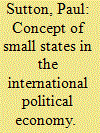

|
|
|
|
|
| Publication |
2011.
|
| Summary/Abstract |
This article examines the literature on small states from the related disciplines of international economics and international politics. By accident and design there is no generally agreed definition and characterisation of small states, although those advanced by the Commonwealth Secretariat and World Bank are most satisfactory. The role of the Commonwealth as a champion of small states is examined. Particular attention is paid to the concept of vulnerability and the challenges and opportunities to small states in a globalised world.
|
|
|
|
|
|
|
|
|
|
|
|
|
|
|
|
| 4 |
ID:
103860
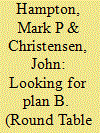

|
|
|
|
|
| Publication |
2011.
|
| Summary/Abstract |
This paper examines offshore finance centres and tax havens that are hosted by small island economies (SIEs). In many cases, hosting offshore finance has been a lucrative activity for SIEs since the 1960s in terms of employment (direct and indirect) and overall contribution to GDP and government revenues. Despite the scale and reach of the global offshore economy, at present many SIE hosts face an unsettled future in light of significant international pressure from nation states, international organisations such as the EU and OECD and, increasingly, from civil society in both the developed and less-developed world. Given the economic importance of hosting offshore finance for many SIEs around the world, the development options facing many island jurisdictions are discussed. The paper poses the fundamental question: what has changed since the major initiatives around the year 2000? Then the situation facing many SIE hosts, the changing global political economy and their shifting negotiations and alliances within it are discussed.
|
|
|
|
|
|
|
|
|
|
|
|
|
|
|
|
| 5 |
ID:
103859
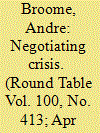

|
|
|
|
|
| Publication |
2011.
|
| Summary/Abstract |
How do small states use international organisations to manage the consequences of exogenous shocks? This article examines this question through exploring how small states negotiate with the International Monetary Fund (IMF) for crisis management support during a period of 'disaster capitalism'. Focusing on the case of Iceland, the article argues that while small states can potentially build scale economies in specialist sectors such as banking, the risks inherent in rapid financial expansion greatly increase their vulnerability to external shocks. In such circumstances, small states are likely to struggle to level the playing field in their attempts to negotiate the constraints and opportunities provided by engagement with the IMF during international crises, when they face higher stakes compared with larger economies and have a narrower policy choice set at their disposal.
|
|
|
|
|
|
|
|
|
|
|
|
|
|
|
|